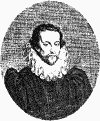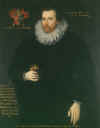
Sir Edward COKE
(Lord Chief Justice of the King's Bench)
Born: 1 Feb 1549, Mileham, Norfolk, England
Died: 3 Sep 1633, Stoke, Buckinghamshire, England
Father: Robert COKE
Mother: Winifred KNIGHTLEY
Married 1: Bridget PASTON
Children:
1. Edward COKE (b. 1583) (m. Elizabeth Potter)
2. Robert COKE (Sir) (b. 1586 - d. 1653) (m. Teophila Berkeley)
3. Arthur COKE (b. AFT 1587) (m. Elizabeth Waldegrave)
4. John COKE (b. AFT 1588) (m. Muriel Wheatley)
5. Henry COKE of Thorington (b. AFT 1589) (m. Margaret Lovelace)
6. Clement COKE of Langford (b. AFT 1590 - d. 1629) (m. Sarah Reddish)
7. Anne COKE (m. Ralph Sadler)
8. Bridget COKE (m.1 William Barley - m.2 William Skinner)
9. Son COKE
10. Son COKE
11. Son COKE
Married 2: Elizabeth CECIL
Children:
12. Elizabeth COKE (b. 1599 - d. 1623)
13. Frances COKE (b. ABT 1601 - bur. 4 Jun 1645, Oxford, St.Mary's) (Associated with Sir Robert Howard)
The Coke family owned land in Norfolk from the thirteenth century. Sir Edward Coke, Educated at Norwich Grammar School and Trinity College, Cambridge, Lord Chief Justice, added greatly to the Norfolk estates, inherited Suffolk property through his wife Bridget Paston of Huntingfield, and purchased estates in Buckinghamshire (Farnham Royal), Dorset (Durweston, etc.), London (Bevis Marks), Oxfordshire (Minster Lovell), Somerset (Donyatt) and elsewhere. His eldest son, Robert, married Teophila Berkeley, grand-daughter of Henry, Lord Berkeley, inheriting the property estate in Somerset. Property in Derbyshire, Lancashire and Suffolk was settled on, or acquired through marriage by a younger son of Sir Edward Coke, and used again thereafter to provide for a junior branch of the family.
When Coke was 30, he married youngest Bridget Paston, who descended from a wealthy Suffolk family and came with a dowry of £30,000. He developed ties with Lord Burghley, a councilor to Queen Elizabeth. After a succession of minor positions, he was appointed Solicitor General by Queen Elizabeth in 1592. She named him speaker of the House of Commons the following year, and in 1594 chose him over Francis Bacon to be attorney general.
As Attorney General he conducted several trials of treason, prosecuting the Earls of Essex and Southampton (1600-01), Sir Walter Raleigh in 1603 and the conspirators in the Gunpowder Plot in 1605.
|
His wife died, and he soon remarried Elizabeth Cecil, widow of Sir William Newport of Holdenby (nephew and heir of Christopher Hatton); granddaughter of Lord Burghley and niece of Robert Cecil, the most influential minister of Queen Elizabeth and, for a while, of her successor, James I. This second marriage was rocky, but it brought him even more property. Coke was made Lord Chief Justice of the Court of Common Pleas. He was a champion of Common Law and held the belief that it was the supreme law and far more powerful than the King, which upset James I. He upset King James I again when he stated that 'the King cannot change any part of the common law nor create any offence by proclamation which was not an offence before'. Cunning plan by James I - appoint Coke to be Lord Chief Justice of the Court of King's Bench, and he would be bound to look after the King's interests, but he continued to maintain the supremacy of the common law, and continued to upset the King. The Privy Council, supported by Bacon, brought several charges against Coke and on 14 Nov 1616 he was dismissed. In order to regain influence, he offered his daughter in marriage to Sir John Villiers, the brother of the Duke of Buckingham. His wife, supported by Bacon, hid the 14-year-old girl, but Coke abducted her and had her forcibly married to Villiers.The two men who were to be most directly responsible for Bacon's downfall had both recently married into the tribe of Buckingham's family. Sir Lionel Cranfield had found himself obliged, much against his will, to give up his betrothal to Lady Effingham and engage himself instead to marry a niece with neither dowry nor looks, Sir Edward Coke, after haggling three years before over the dowry, had finally bought his way back on to the Council by giving his reluctant daughter in marriage to this same brother of the favourite Buckingham. Both Cranfield and Coke were lobbying for parliamentary support in their struggle for power. They saw in the new Parliament an opportunity of gaining influence at Bacon's expense. A dangerous political situation was developing. It would seem that the real problem was that many people, and the Parliament that was meeting, had finally had it with Buckingham's influence over the King (and the resulting political influence of Buckingham's family). Instead of attacking the King directly, Coke and parliament attacked the two highest ministers, Bacon and Henry Montague, Lord Treasurer. |

|
By 1617 Coke was back in the Privy Council and in the Star Chamber. He re-entered Parliament, opposed Prince Charles' proposed marriage to a Spanish princess and took part in drawing up bribery charges against Bacon.
Died 3 Sep 1634 at Stoke Poges, Buckinghamshire, all his papers were instantly seized including his will.
 to Bios
Page
to Bios
Page |